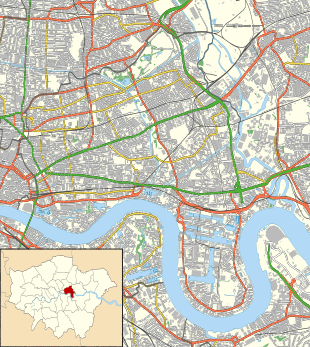The Blind Beggar
| The Blind Beggar | |
|---|---|
 The Blind Beggar in 2008 | |
 Location within East London | |
| General information | |
| Address | 337 Whitechapel Rd, London E1 1BU |
| Coordinates | 51°31′12″N 0°03′25″W / 51.5200°N 0.0569°WCoordinates: 51°31′12″N 0°03′25″W / 51.5200°N 0.0569°W |
| Opened | 1894 |
| Website | |
| http://www.theblindbeggar.com/ | |
The Blind Beggar is a pub on Whitechapel Road in Whitechapel, East London, England. It is notable as the former brewery tap of the Manns Albion brewery, where the first modern Brown Ale was brewed. The pub was built in 1894 on the site of an inn which had been established before 1654, and takes its name from the legend of Henry de Montfort.
The pub is known for Ronnie Kray's murder of George Cornell in front of witnesses, and as the location of William Booth's first sermon, which led to the creation of The Salvation Army.
History
The pub was built in 1894 on the site of an inn which had been established before 1654,[1] and named after the legend of Henry de Montfort, a son of Simon de Montfort.
In 1865, William Booth preached his first open-air sermon outside the Blind Beggar, which led to the establishment of the East London Christian Mission, later to become the Salvation Army.[2] William Booth is commemorated by a nearby statue.[3]
The Blind Beggar is notorious for its connection to East End gangsters the Kray twins. On 9 March 1966, Ronnie Kray shot and murdered George Cornell, an associate of a rival gang, the Richardsons, as he was sitting at the bar.[2] The murder took place in the then saloon bar.[4][5]
The pub is also a popular starting point for the Monopoly Pub Crawl, despite being located on the board's third space.
The pub was frequented by Harry Redknapp and was owned by Bobby Moore at one stage.[6]
The freehold ownership of the pub was sold at Allsop auction on 17 May 2010, the buyers being a family of Indian descent who previously owned a casino in Whitechapel at the time of the Krays.
Henry de Montfort legend
In the Blind Beggar legend, de Montfort was wounded and lost his sight in the Battle of Evesham in 1265 and nursed to health by a baroness, and together they had a child named Besse. He became the "Blind Beggar of Bethnal Green" and used to beg at the crossroads. The story of how he went from landed gentry to poor beggar became popular in the Tudor era, and was revived by Percy’s Reliques of Ancient English Poetry, published in 1765.[7] The legend came to be adopted in the arms of the Metropolitan Borough of Bethnal Green in 1900.
References
| Wikimedia Commons has media related to The Blind Beggar. |
Citations
- ↑ Bethnal Green: Settlement and Building to 1836, A History of the County of Middlesex: Volume 11: Stepney, Bethnal Green (1998), pp. 91-95 accessed: 6 December 2007
- 1 2 Sullivan 2000, p. 26.
- ↑ General William Booth - Salvation Army accessed 3 Dec 2007
- ↑ Inside the Firm: The Untold Story of the Krays' Reign of Terror Tony Lambrianou (Pan Books 2002) ISBN 0-330-49014-1
- ↑ BBC News: Kray twins guilty of McVitie murder
- ↑ "The other side of West Ham and England's Bobby Moore 'King of the Bar Stool'". Retrieved 2014-06-18.
- ↑ "The Blind Beggar". eastlondonhistory.com. Retrieved 2012-07-15.
Sources
- Sullivan, Edward (2000). Evening Standard London Pub Bar Guide. Simon and Schuster. ISBN 978-0-684-86840-0.